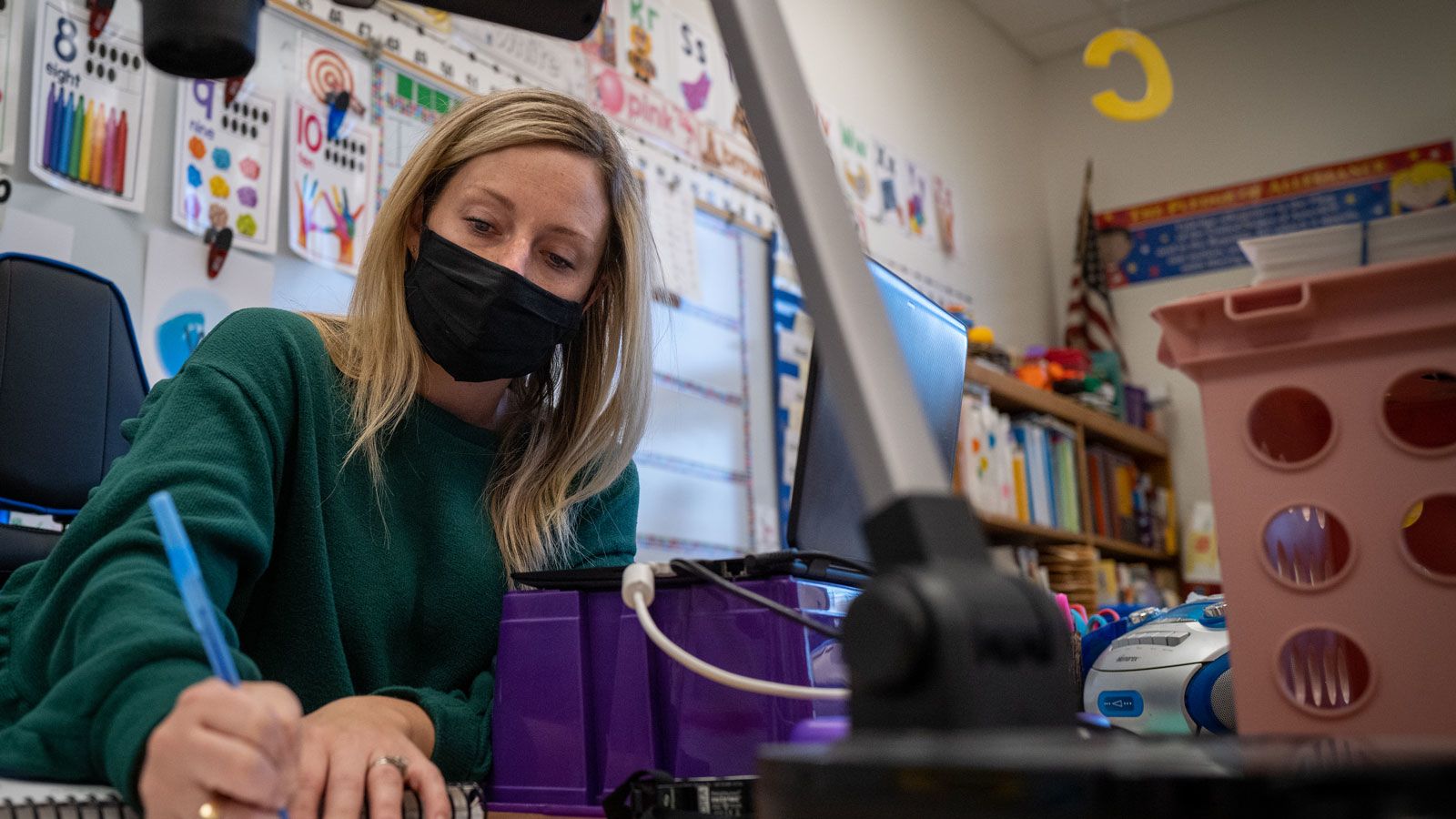

“Get back to school” headlines eroded teacher wellbeing during the pandemic
Intense public pressure on teachers to “get back to school” during the COVID-19 lockdowns deepened an already widespread sense that they were undervalued, and left some actively rethinking their careers, research shows.
The finding comes from newly published research, following on from an earlier study with a small group of primary and secondary teachers during lockdown. Researchers from the Universities of Cambridge and York monitored the group for almost two years from March 2020, charting an overall decline in their wellbeing and mental health. In the new report, they show how this was linked to the portrayal of teachers amid wider debates about whether schools should lock down, and for how long.
While other frontline workers were lauded as ‘heroes’, teachers felt they were being left out of this narrative and even perceived as ‘lazy’, despite their key worker status, the study shows. In particular, continual news stories during mid-2020 clamouring for schools to reopen led some teachers to believe that parents, and wider society, thought they were neglecting their duties.
In reality, teachers were shouldering higher workloads as they adjusted to ever-changing government guidance. The researchers describe the aggregate effects of their public portrayal as “psychologically costly” and suggest it may have worsened a well-documented retention crisis in the profession.

Constant headlines about getting them back to school made teachers believe that people thought they were sitting at home doing nothing.
Dr Laura Oxley, from the Faculty of Education, University of Cambridge, said: “Although lots of parents may not have actually thought teachers were lazy, the nature of public discussion meant that teachers started to feel that was the case.”
“At the time, there was lots of praise for the NHS, delivery drivers, retail workers. Teachers were frontline workers too, but were often not part of the narrative. Constant headlines about getting them back to school made many teachers believe that people thought they were sitting at home doing nothing. This didn’t cause the decline in teacher mental health, but it appears to have contributed to it.”
The study arose from an earlier research project, ‘Being a teacher in England during the COVID-19 pandemic’ led by Dr Lisa Kim from the University of York. In it, researchers monitored a sample of 24 teachers, who were interviewed seven times between April 2020 – just after schools first closed – and July 2022. The mental health of the participants was found to have declined in that time. Alongside heavy workloads and ongoing uncertainty, teachers cited a creeping sense of “negative public perceptions” as a contributing factor.
In the new study, the team assessed whether this belief about perceptions was grounded in objective reality. They surveyed eight leading national newspapers, identifying 156 cases in which stories about COVID-19 and pre-16 education made front page news between March 2020 and January 2022.
These often either explicitly or implicitly suggested that teachers bore direct responsibility for school closures and other key developments in the education sector. Spikes in the coverage coincided almost exactly with when teachers reported sharp falls in their own mental health. While the decline was driven by the impact of events, the researchers suggest it was exacerbated by the news coverage.
The analysis focused on front page headlines because they reach a large audience, comprising both newspaper buyers and a ‘passing’ readership. Aside from stories about the handling of A-Levels, education made big headlines during the build-up to schools reopening in spring 2020, and the partial closures of January 2021.
Public narratives matter, and we need to think carefully about this if we want to encourage more high-quality professionals into education
Some explicitly criticised teachers for “demanding” that schools stay closed. More broadly, much-criticised national headlines called for teachers to be “heroes” by returning to schools while the health risks remained high, or reported the guidance of unions and doctors about whether they should do so.
The research suggests this constant discussion made teachers feel as though the public was waiting for them to make a decision about returning to the classroom, and that the longer they stayed away, the more they were seen to be ‘failing’ children.
Kim, from the University of York’s Department of Education, said: “There seems to be a relationship between the frequency of these headlines and teachers’ own mental health. Though we cannot determine whether there is a causal relationship, it seems that it added to the pressure, particularly because some commentary seemed to be encouraging a blame culture.”
This was confirmed by evidence gathered from the project participants and published in the preceding study. In interviews conducted in April and May 2020, for example, one told the researchers: “People think we’re at home on full pay doing nothing, which is not great for your mental health.” Later that summer, one teacher confessed: “There were times when I felt, and feel, that I’ve had enough. I don’t want to do this anymore, because you can’t see a light at the end of the tunnel.”
Teachers emerged from the experience feeling underappreciated. In November 2020, after schools reopened, one told the team: “I was working really hard and it almost feels like what we’ve been doing hasn’t really meant anything.” They reported avoiding looking at social media because criticism of teachers was so widespread.
The researchers say these outcomes are a concern given the present teacher recruitment and retention crisis. Many teachers identify strongly with their job because they see it as rewarding and worthwhile, despite the modest pay. This was eroded during the pandemic, the researchers suggest, because of a deepening sense of being undervalued.
“It’s striking that so little was said about the extraordinary efforts teachers were making,” Oxley added. “Public narratives matter, and we need to think carefully about this if we want to encourage more high-quality professionals into education.”
The report is published in Psychology of Education Review.
Image in this story: "Teachers Teaching" by Phil Roeder is licensed under CC BY 2.0 DEED. The original image has been cropped slightly to a 16:9 ratio.
